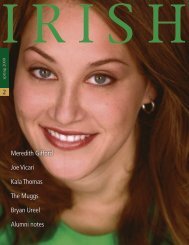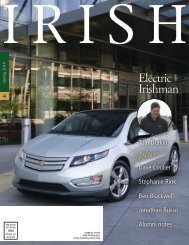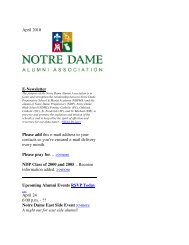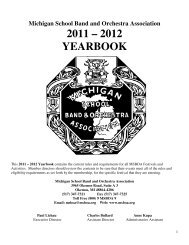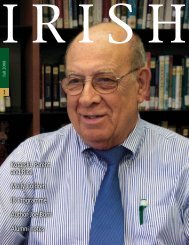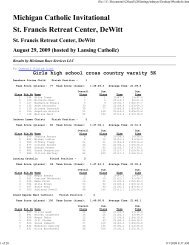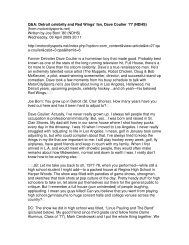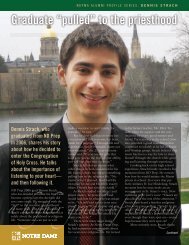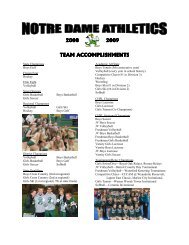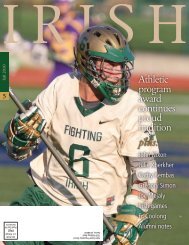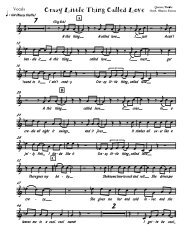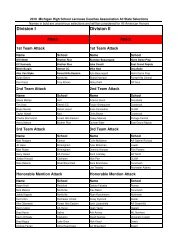Fall 2009 - Notre Dame Preparatory School and Marist Academy
Fall 2009 - Notre Dame Preparatory School and Marist Academy
Fall 2009 - Notre Dame Preparatory School and Marist Academy
You also want an ePaper? Increase the reach of your titles
YUMPU automatically turns print PDFs into web optimized ePapers that Google loves.
I continue to do work on issues I care<br />
deeply about.<br />
David Bonior<br />
for 26 years—the longest tenure of any congressman from that district.<br />
Bonior retired at the end of 2002, but not before serving 10 years<br />
as Democratic Whip, the second-ranking Democrat in the House.<br />
His tenure in Congress was marked by a passion for social <strong>and</strong><br />
economic justice. Bonior earned a reputation as a strong voice for<br />
working families <strong>and</strong> as a leader on the environment, fair trade, jobs,<br />
<strong>and</strong> human <strong>and</strong> civil rights.<br />
Born in Detroit <strong>and</strong> raised in East Detroit (now Eastpointe),<br />
Bonior graduated from the University of Iowa, received a Masters<br />
Degree in history from Chapman College in California, served in the<br />
Air Force, <strong>and</strong> worked as a probation officer <strong>and</strong> adoption caseworker<br />
before he began his political career in the Michigan Legislature in 1972.<br />
Currently, Bonior is chairman of the board of American Rights at<br />
Work (ARAW) <strong>and</strong> has served in this role since he began<br />
the organization in 2003. He is the author of two books:<br />
The Vietnam Veteran: A History of Neglect <strong>and</strong> Walking to<br />
Mackinac. He previously served as University Professor of<br />
Labor Studies at Wayne State University <strong>and</strong> on the boards<br />
of Public Citizen <strong>and</strong> Community Central Bank in Mount<br />
Clemens. In 2007-2008, Bonior took a leave of absence<br />
from American Rights at Work to join John Edwards’<br />
presidential campaign as the national campaign manager.<br />
He also worked on President Obama’s transition team.<br />
He <strong>and</strong> his wife Judy now live in Washington, DC, <strong>and</strong><br />
their three children <strong>and</strong> seven gr<strong>and</strong>children also live in<br />
close proximity. The former congressman recently sat down<br />
<strong>and</strong> spent a few minutes of his busy schedule to talk to<br />
IRISH about his current avocation, his new home away from home in<br />
Washington, DC, <strong>and</strong> <strong>Notre</strong> <strong>Dame</strong> High <strong>School</strong>.<br />
Bonior still owns a house in Mt. Clemens, Michigan, but moved<br />
permanently to Washington in November of last year. He says the main<br />
reason other than his work was to be near his kids <strong>and</strong> gr<strong>and</strong>kids.<br />
“We live very close to the Washington Nationals’ new ballpark,”<br />
he said. “My wife <strong>and</strong> I go to a lot of baseball games since our home is<br />
within walking distance of the park. I’m still a big Tigers fan, though,<br />
<strong>and</strong> always wear my Detroit Tigers garb to the Nationals games. My<br />
gr<strong>and</strong>children are all around five years old, so we’re now starting to<br />
take them to the games.”<br />
Bonior’s work of late has been mainly with ARAW, a nonprofit<br />
organization he founded that is focused on the rights of workers, especially<br />
their rights to collective bargaining. With health care, climate<br />
change <strong>and</strong> a host of other legislative issues pending in Congress, he is<br />
working hard to get the Employee Free Choice Act, better known as<br />
the “card check” bill, on the floor for action. He has about 25 people<br />
working for him currently <strong>and</strong> also teaches part-time at the University<br />
of Iowa as a professor of political science. So between teaching, the<br />
ARAW, <strong>and</strong> his family—it all keeps him very busy.<br />
But he’s trying to gradually remove himself from the Washington<br />
treadmill. “Actually I’m trying to do less,” he said. “At my age I’m trying<br />
to wind down. Right now, though, what I’m working on specifically<br />
is labor unification—bringing together the NEA, the AFL/CIO,<br />
<strong>and</strong> a number of other big labor organizations. I’m asked to do these<br />
types of things because of my experience <strong>and</strong> the fact that I’ve been<br />
around the block a few times. But at the same time I want to kind of<br />
wind down. During this chapter of my life, I value my time more <strong>and</strong><br />
more along with my kids <strong>and</strong> gr<strong>and</strong>kids. But I don’t want to withdraw<br />
completely—I’ve always been active in my community.”<br />
When it was mentioned that it seems like he does more work in<br />
retirement than most people do while working, Bonior says that “yes, I<br />
continue to do work on issues I care deeply about.”<br />
Once the conversation with Bonior turned to <strong>Notre</strong> <strong>Dame</strong>, a flood<br />
of memories came forth <strong>and</strong> it was clear that his time at ND also was a<br />
period in his life he cared deeply about.<br />
He mentioned numerous faculty members who were important<br />
influences on him in high school <strong>and</strong> beyond. “Mr. Raymond was<br />
certainly a big influence,” he said. “A great teacher—taught me physics.<br />
And Conrad Vachon, who was as good a teacher as I’ve ever had.<br />
(I remember) he made me miss a baseball game once. Kept me after<br />
school. But he did the right thing. I was mad at him, but it was the<br />
right thing to do. Also, I had a habit of silent reading with my lips. He<br />
cured me of that by sticking a pencil in my mouth!”<br />
Bonior also fondly recalls what may have sparked his interest in<br />
serving his fellow man. “There used to be a column published in the<br />
Detroit News by a journalist named Ralph McGill,” he remembered.<br />
“He was out of Atlanta <strong>and</strong> worked for the Atlanta Journal-Constitution<br />
but also was published in the News. He wrote primarily about<br />
civil-rights issues. Of course when I was in high school, it was the peak<br />
of the civil-rights movement. Conrad turned me on to McGill <strong>and</strong> to<br />
social issues, <strong>and</strong> it also was the first time I read something outside of<br />
the sports page.”<br />
Bonior said he didn’t have Tom Kelly as a teacher, “but he was my<br />
baseball coach <strong>and</strong> the school’s athletic director. I remember at my last<br />
baseball game with ND, he played me at every position on the field.<br />
It was a really nice thing to do—I’ll always remember that. Tom Kelly<br />
was perhaps the most beloved person in that whole community. People<br />
really loved Tom—they had a high regard for him as a person. Just a<br />
good, good man. A very special guy.”<br />
Bonior also remembers a few others from his heyday at ND. “Fr.<br />
St. Onge, who was principal when I was at ND, was a great guy—kind<br />
of quiet but he carried himself with a tremendous amount of dignity.<br />
And Fr. Bryson—what an institution! Fr. Hollywood had all those great<br />
stars who came to dances. Fr. Gallant <strong>and</strong> Fr. Saunders also were very<br />
good teachers. And Mr. Egan—I remember him as a pretty cool guy.”<br />
For young men <strong>and</strong> women from his alma mater, Bonior offered<br />
the following advice: “Take advantage of the opportunities before<br />
you—internships, studying abroad, helping in your own communities,<br />
charitable groups, human-services organizations, etc. Those are really the<br />
enriching pieces of life that complement your education. It’s very important<br />
to take advantage of each of them as you progress through your<br />
schooling. Education just for the sake of education without applying it<br />
in the community is not the way to go. Combining what you learn in<br />
the classroom with what you do in the community is important.”<br />
We couldn’t agree more. •<br />
FALL <strong>2009</strong> 19



